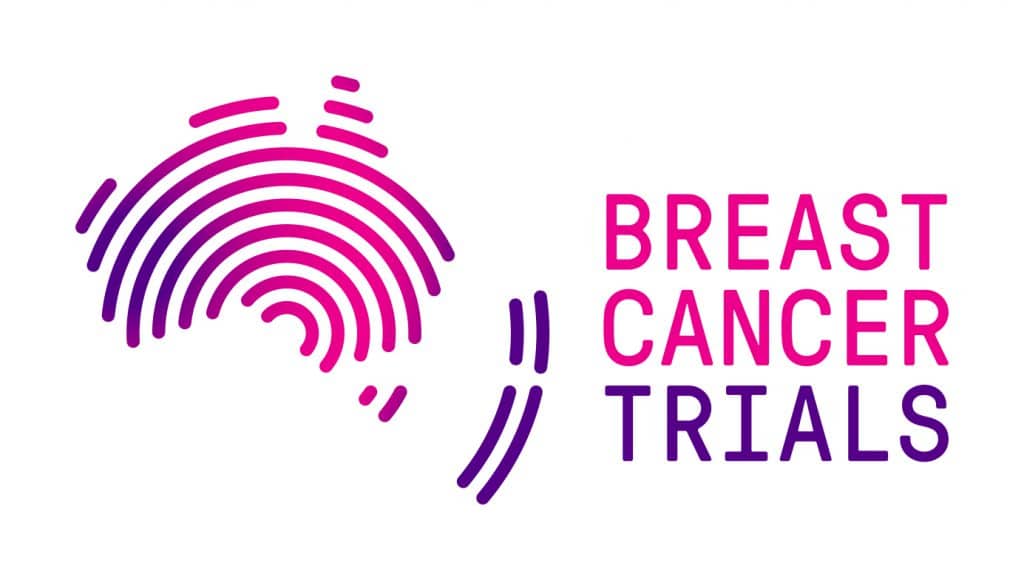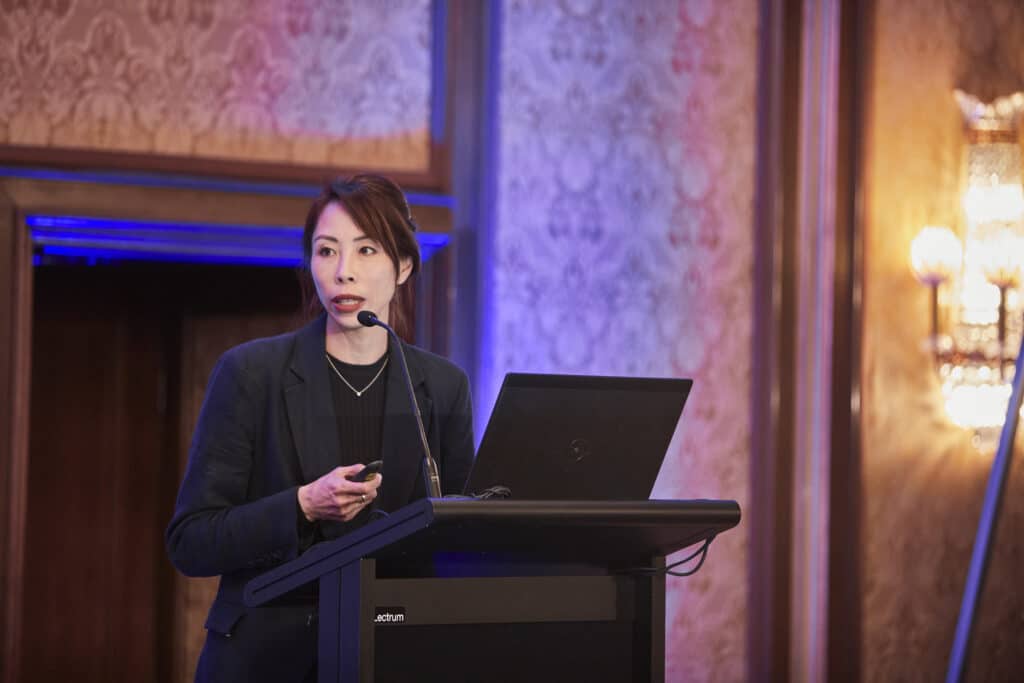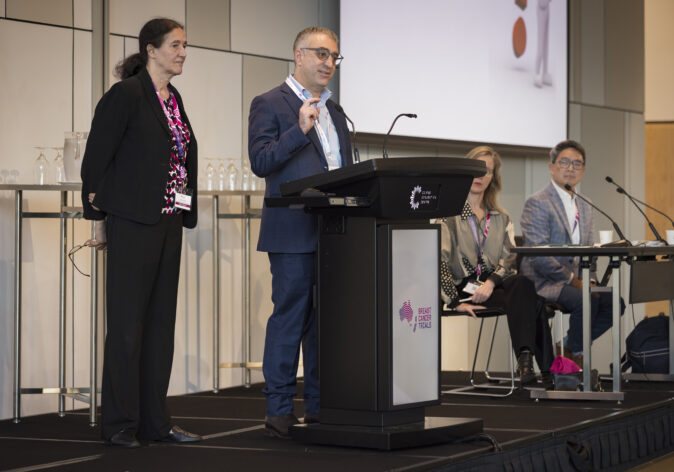American Society of Clinical Oncology (ASCO 2024)
The American Society of Clinical Oncology (ASCO) annual meeting is one of the world’s largest and most renowned cancer conferences, bringing together leading cancer researchers, including those from Breast Cancer Trials (BCT), to discuss the latest advancements in treatments, clinical trials research and cancer care.
The following is a summary of the key breast cancer clinical trials research that BCT and other groups presented at ASCO 2024.
CHARIOT Clinical Trial
The CHARIOT clinical trial is a pioneering study from Australia developed by BCT researchers. It looked at a new way to treat early-stage triple negative breast cancer resistant to initial treatment with chemotherapy.
The trial tested a combination of two immunotherapy drugs (nivolumab and ipilimumab) with a standard chemotherapy drug (paclitaxel) before surgery. The aim was to see if this combination could safely stimulate the body’s immune system to destroy the cancer cells.
The trial also investigated if continuing with one of the immunotherapy drugs (nivolumab) after surgery could keep the immune system active to wipe out any remaining cancer cells. 34 patients from eight different institutions in Australia participated in this trial, which was led by BCT Board Director Professor Sherene Loi.
Researchers found that patients who had no signs of cancer in their breast and lymph nodes after surgery were less likely to have their cancer come back and had a better chance of survival. Notably, all the patients whose cancer showed an increased presence of a protein called PD-L1, or had a high number of certain immune cells (TILs), were alive and free from breast cancer three years later. This comes with a significant risk of mild to moderate lung inflammation from immunotherapy.
This suggests that the treatment approach tested in the CHARIOT trial could be a promising option for patients with this type of cancer, potentially leading to better outcomes and longer survival. However, more research and follow-up studies are needed to confirm these results and determine the long-term effectiveness and safety of this treatment approach.
Explore the CHARIOT clinical trial results here.
Destiny Breast 06
The Destiny Breast 06 trial is a groundbreaking study that brings new hope for patients with hormone-positive advanced breast cancer. This study looks at a specific group of these patients with low or very low levels of a protein called HER2. The trial is focused on testing a drug called trastuzumab deruxtecan (T-DXd), which is designed to specifically target cancer cells and cause less damage to healthy cell, on patients whose cancer is not responding to standard hormone therapy.
The results of the trial were promising. Patients who were treated with T-DXd saw their tumors shrink significantly and had more time before their cancer progressed compared to those receiving standard chemotherapy.
While T-DXd was effective, it was more likely to cause side effects compared to standard chemotherapy. Notably, moderate to severe lung inflammation can occur and needs to be monitored for closely.
These findings represent a significant step forward in the treatment for hormone positive, advanced breast cancer as these patients could never be treated with HER2-targeted therapy in the past.
ctDNA Results for MonarchE
The MonarchE trial looked at how a drug called abemaciclib, when used with standard hormone therapy, could help patients with early-stage breast cancer who are at high risk of the disease coming back.
One of the ways the researchers checked how well the treatment was working was by using a blood test called circulating tumour DNA (ctDNA) testing. This test finds DNA from cancer cells that have entered the bloodstream, allowing doctors to track the presence and quantity of breast cancer cells in the body.
The ctDNA results from the MonarchE trial were presented by Professor Sherene Loi. It showed that patients who had the combination of abemaciclib and hormone therapy had less ctDNA in their blood compared to those who had hormone therapy alone. This suggests that the combination treatment was more effective in reducing the amount of cancer cells in the body.
The use of ctDNA testing may be able to diagnose the return of cancer earlier in high risk breast cancer patients after surgery. However, more research is needed before we can show that ctDNA testing can guide treatment decisions if signs of cancer DNA is identified.
Breast Cancer Trials is using ctDNA testing in the CAPTURE clinical trial.
Exercise for Cancer Related Fatigue After Early-Stage Breast Cancer Chemotherapy
This study looked at how exercise can help with tiredness (also known as ‘cancer-related fatigue’) in patients who have finished chemotherapy for early-stage breast cancer. The researchers wanted to find out the best ‘dose’ of exercise to reduce this tiredness. This could include things like how often, how long, and how intense the exercise sessions should be.
Before starting chemotherapy, patients with breast cancer were walking for about 40-60 minutes a week at a slow pace, or 20-30 minutes a week at a faster pace.
The researchers found that patients who increased their walking to 111-162 minutes per week at a slow pace, or 54-108 minutes at a faster pace, were 43% more likely to see a big drop in their tiredness. This was true both before chemotherapy and one month after chemotherapy.
These results are important for designing exercise programs to improve the quality of life for breast cancer survivors who feel tired after chemotherapy. Knowing the best ‘dose’ of exercise can help doctors give exercise advice that’s tailored to each patient’s needs.
The RxPONDER Study
Menopause status can inform cancer treatment selection, but knowing when a woman is in menopause can be difficult to determine.
Anti-mullerian hormone (AMH) is a hormone produced by the ovaries that can indicate ovarian reserve and function, with lower levels found in post-menopausal women.
Researchers analysed data from the previously published RxPONDER study and found that premenopausal women with invasive breast cancer who had low levels of AMH, benefitted less from chemotherapy in addition to endocrine treatment, compared to women with medium or high levels of AMH.
Researchers found that AMH was a stronger predictor of chemotherapy response than self-reported menopause status, age and serum levels of other hormones associated with ovarian functioning.
This information could potentially refine treatment decisions, helping to identify which premenopausal women can be spared from unnecessary chemotherapy.
QoL Data from the INAVO-120 Trial
Updated results from the phase three INAVO-120 trial, showed that inavolisib plus palbociclib and fulvestrant improved progression free survival of patients with PIK3CA-mutated, hormone-receptor (HR) positive, HER2-negative metastatic breast cancer.
This triple combination treatment is a promising new treatment option for patients, which halved the risk of disease progression or death, and the time to next treatment, compared to placebo, palbociclib and fulvestrant.
Patient-reported outcomes data suggest patients receiving inavolisib in addition to fulvestrant and palbociclib experienced a longer median time to worsening in pain severity and maintained day-to-day functioning and HRQOL [health-related quality of life] while on treatment with little increased treatment burden.
Impact of Endocrine Therapy in ER-Low Breast Cancer
New research indicates that there may be a survival disadvantage if oncologists omit adjuvant endocrine therapy for patients with a diagnosis of breast cancer, who have low levels of estrogen receptor (ER) expression or ER levels 1-10%.
The retrospective study used data from 354,378 patients with stage I to III ER-positive breast cancer identified in the National Cancer Database (NCDB) in the United States. The NCDB began listing ER status as a continuous variable in 2018. So this study included patients registered in the database from 2018 to 2020.
Overall, 10,362 or 3% of ER-positive breast cancers were classified as ER-low. Of these, 68% were progesterone receptor (PR) negative and 67% were HER2 negative. The majority (77%) of patients were treated with chemotherapy, and these patients formed the study cohort.
Adjuvant ET was omitted in 41% of patients with ER-low status. Researchers found that in this cohort, there was a 25% increased risk for death associated with omission of endocrine therapy despite receiving chemotherapy.
The GEICAM/2003-11 Trial
Triple negative breast cancer (TNBC) has a higher risk of relapse than other breast cancers. Patients with early-stage TNBC are typically treated with surgery and chemotherapy, and sometimes radiotherapy.
Despite effective treatments with neoadjuvant and adjuvant chemotherapies with anthracyclines and taxanes, the recurrence rate for these patients is high. Up to 10% of those with stage I disease will relapse, as will 15-20% of patients with stage II disease, and 25-50% of those with stage III disease. With such high recurrence rates, patients and doctors need better treatment options.
The GEICAM/2003-11 clinical trial explored whether extending treatment with six months of capecitabine after completing standard chemotherapy, improved disease free survival of patients with early TNBC.
This study failed to show a statistically significant increase in disease free survival by adding capecitabine to standard chemotherapy in patients with early TNBC. However, extended treatment with adjuvant capecitabine did significantly improve both disease free and overall survival in a subgroup of patients with a non-basal like phenotype.
Patients are not currently differentiated in basal-like and non-basal like phenotypes and all TNBC is treated the same way. So researchers are now planning to look at the immunohistochemical and genomic characteristics of the patients, to help identify which subgroups of patients with TNBC will benefit from the addition of capecitabine.



